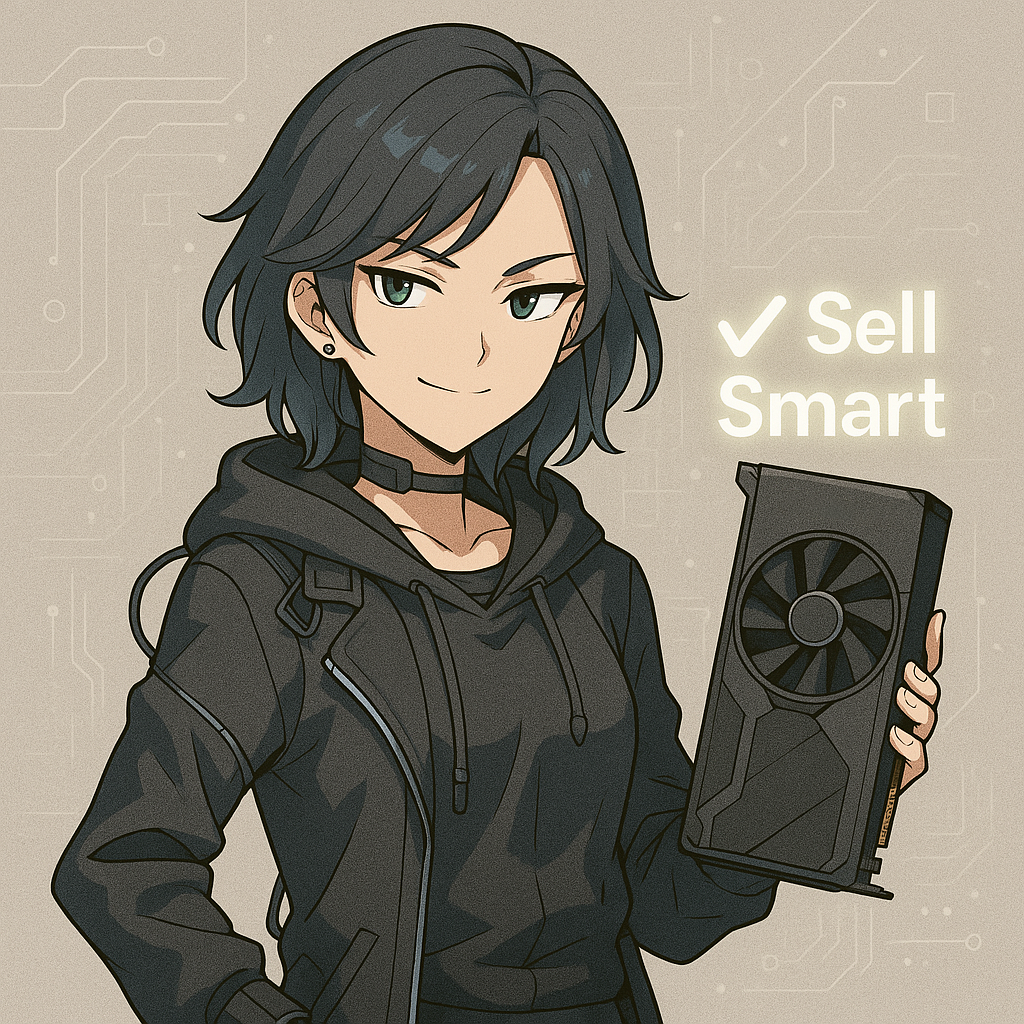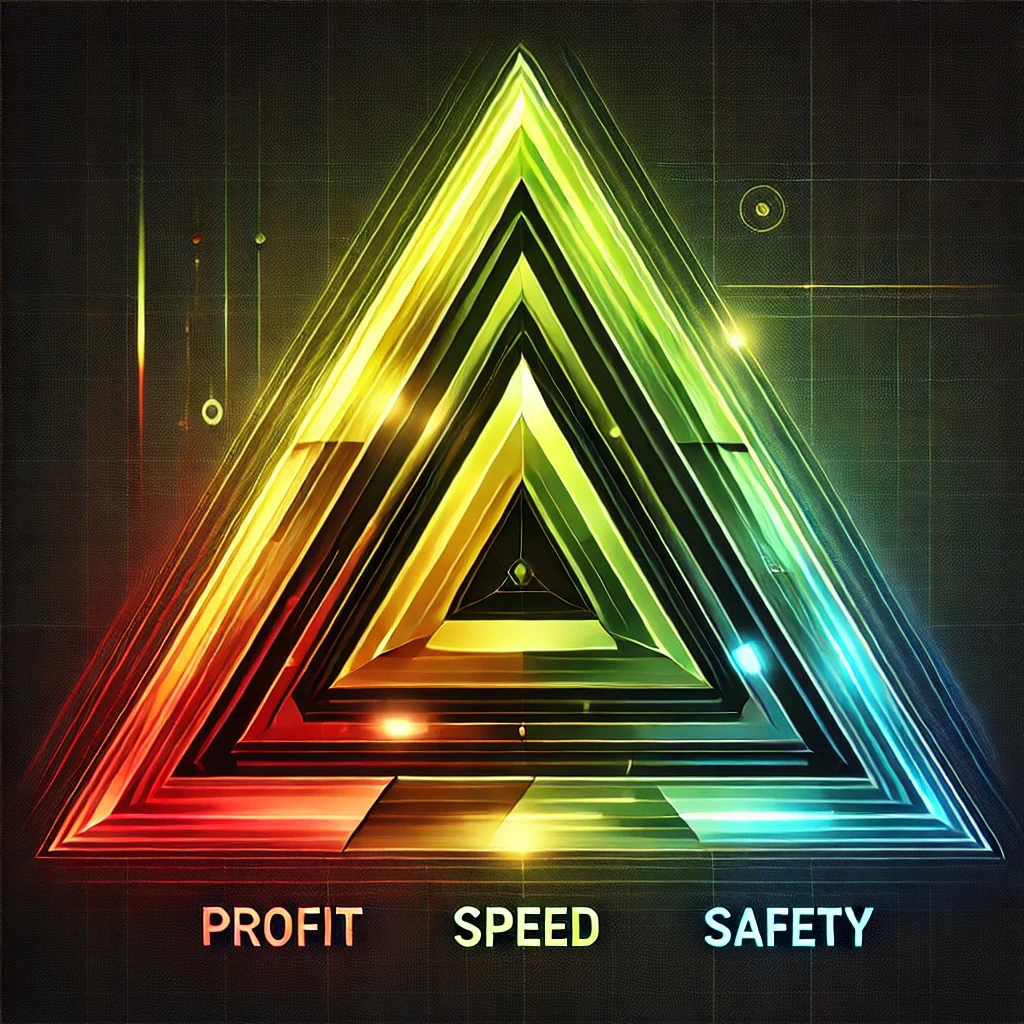Selling your GPU doesn’t need to be complicated. Whether you’re upgrading your gaming rig, liquidating your mining hardware, or decluttering tech gear, this comprehensive guide covers everything you need—from pricing and preparation to secure payments and post-sale considerations. We’ve sold thousands of GPUs and compiled expert tips to help you maximize profits and minimize headaches. Also, there’s an obviously vibecoded GPU cleaning minigame somewhere down below that will make the dustbunnies in your case shiver with fear.

Step 1: To Start, Determine the Market Value of your Graphics Card
Quick Online Price Research Methods
TL;DR: Review eBay’s recently sold listings for actual sales values
Before listing your GPU for sale, do some basic research on the market conditions for your specific model. GPU prices can fluctuate dramatically based on factors like crypto mining trends, new gaming releases, and chip shortages. That said, most GPUs are still worth something, as even older models may still be used in builds with lower performance requirements.
Review recent completed sales rather than just looking at listed prices, as sellers often overvalue their cards. Remember that a card listed at $400 might actually sell for $325, so base your expectations on actual transaction data.
Understanding sales history and price trends will help you set the best price that still appeals to buyers.
Head to eBay’s “sold” listings and…

eBay’s “sold” listings are useful for seeing actual sale prices rather than asking prices. To do this, filter for items that have sold recently, in the past 30 days, is usually the most helpful view, and match your GPU’s condition as closely as possible. You may also want to make a mental note of any price differences for items with the original packaging and accessories. Once you’ve done a bit of research, You’ll get a more accurate sense of what buyers are actually paying.
eBay recently released a feature that helps you set a price for your item based on trending prices. While I don’t recommend blindly trusting their recommendation, as I’ve found that they often price too low, it can be a great place to start if you want to skip the research step if you’re selling on eBay.
✔️ Your GPU is now Priced Appropriately
With a well-informed understanding of your GPU’s value, you can set a price that aligns with the market. A lower-than-average price will attract quicker offers, while a higher price may take longer to sell. Most buyers tend to sort by lowest price + shipping on eBay and Facebook Marketplace. Remember, GPU prices can fluctuate over time as new technology becomes available.
If your item is not selling fast, review your pricing, images, or description. We will discuss this in the next section.
Step 2: Prepare your GPU for sale
To attract buyers and maximize your profits, ensure that your used graphics cards are in the best possible condition. Clean dust and debris from the cards and test them to guarantee that they’re functioning optimally. Providing detailed information about each card’s performance, including benchmark results, can also help win over potential buyers.
Many sellers skip crucial preparation steps that could protect them from future problems. Let’s dive in to the essential steps:
Time needed: 30 minutes
Getting your GPU ready for sale
- Performance Testing
Run a basic performance test to ensure that your GPU meets the standard benchmarks expected of your GPU model. If you incorporate this data in your listing, more experienced buyers will feel more comfortable purchasing your GPU.
- Cleaning with compressed air
Thorough use of compressed air around the ports and heatsink are a good start to remove the excess dust.
Feel free to try our comprehensive compressed air GPU cleaning training course!Dust: 0%
- Surface cleaning with detergents and solvents
Don’t use household cleaners that could damage sensitive electronic components.
Instead opt for alcohol or contact cleaner. Use just enough to remove grease and dust.
Take care around labels. - Take adequate product photos
Take photos of all sides of the GPU and make sure to take closeups showing any defects that might cause a buyer to return the card due to the item not being “as described”. Using photoshop is discouraged. Smartphones will do a decent job, just make sure the image format you’re using is accepted by the marketplace where you’re listing the GPU.
✔️ Congrats, your item listing is prepared
So far, we covered price and listing preparation. Next, we’ll choose where to sell your GPU.
Step 3: Choose Where to Sell Your GPU
Selecting the appropriate selling platform depends on your priorities and selling experience.
- Local cash sales typically offer the fastest results but can raise safety concerns and typically yield lower prices, with the tradeoff that you don’t encounter fees with cash deals, you do, unfortunately, encounter a heap of headaches.
- Online marketplaces usually provide better safety through buyer/seller protection but involve longer waiting periods and platform fees that cut into take-home profits.
- Tech-specific platforms and forums often bring the most savvy buyers, typically a smaller buyer pool, resulting in slower sales and increased price sensitivity.
- Tech buyback programs from big box retailers and small companies are an easy button in exchange for a significant haircut in profit.
- If you have a lot of hardware to sell and are OK with getting less profit in exchange for a quick, safe transaction – contact a bulk buyer for an offer.
What’s Your Priority? Fast, Safe or Most Profit?

If you have a bulk lot of hardware to sell, the best option is to get an offer from a company that specializes in buying computer parts and mining rigs. Get an offer from Bitpro.
Selling your single graphics card yourself when top-dollar is your goal, use a peer-to-peer marketplace. Be aware that there are some dangers, hassles, and potential time wasted. Learn more about marketplaces like Facebook Marketplace and Craigslist.
If you want to sell your graphics card safely, consider using an eCommerce site like eBay or Amazon. These platforms offer protection for both you and the buyer.
You may earn slightly less profit, but the transaction will be more secure. You may make slightly less profit, but it’s safer. Check our guide for preparing your listing.
Marketplace Comparison Pros & Cons
Online Marketplaces
eBay & Amazon
- Pros: A large established market & selling process
- Cons: 13% fees + shipping High potential for returns
Intermediated Platforms
Reddit Hardwareswap, Swappa, StockX, Jawa
- Pros: Tech-focused
- Cons: typically lower prices, less protection than eBay
Local Marketplaces
Facebook Marketplace, Craigslist
- Pros: Free, peer-to-peer
- Cons: Highest potential for scams, only transact in-person, safely. Tech support often requested…
Family & Friends
Your cousin or that bud with a half-assembled PC
- Pros: Trusted, low-effort
- Cons: Expectation of below-market price, tech support 4 life
Step 4: Handling the Transaction
Ensure your transaction goes smoothly and securely:
- Use tracked shipping with insurance to protect against loss or damage.
- Use secure payment methods, ideally where payment reversal is difficult.
- Pack your GPU securely, using anti-static bag (if you can) and adequate padding. Think about all the videos of packages being tossed around and add more padding.
Step 5: Avoiding Scams
We cover scams and safety tips thoroughly in our dedicated page, but for the TL;DR:
Stay safe by recognizing red flags:
- Avoid off platform communication
- Avoid accepting checks, money orders or other reversible forms of payment.
- Never ship without confirmed payment.
- Never ship to an alternate address.
- Verify buyer reputation and transaction history on peer to peer platforms.
Step 6: Post Sale Support
After you’ve successfully sold your GPU, there are a few things to keep in mind:
Payment Timelines:
- eBay Managed Payments: Typically 1–3 business days after delivery.
- PayPal: Instant, but be cautious of chargebacks; funds usually hold for new sellers.
- Bank Transfer (ACH): Usually clears in 1–3 business days after initiation.
Returns & Refund Policies:
- Clearly outline your return policy to buyers beforehand.
- On eBay, sellers usually offer 30-day returns. Be prepared to handle return shipping or dispute processes.
Customer Support & Communication:
- Provide clear tracking updates to buyers.
- Respond promptly and professionally to any post-sale inquiries or issues.
Warranty & Dispute Handling:
Keep thorough records (photos, benchmarks, shipping details) to support your case in any disputes. Clearly state if you offer a warranty or sell GPUs “as-is.”
Additional Considerations
GPU Trade-In Programs vs. Cash Sales
Understand your options clearly:
- Trade-ins: Quick and convenient; ideal for hassle-free exchanges at retailers like Amazon, Best Buy or Microcenter.
- Cash Sales: Generally provide better financial returns and flexibility, especially for high-value cards or bulk sales.
- For specialty use cases, such as cryptomining, we offer a trade-in program for high efficiency mining GPUs.
Selling Broken or Old GPUs
Wondering what to do with old or non-functional GPUs? Options include:
- Listing as “broken GPU for sale” or “graphics card for parts” on sites like eBay.
- Recycling through certified e-waste programs. Find one near you.
- Selling to specialized buyers who purchase damaged tech for refurbishment.
Selling Other PC Parts
GPUs aren’t the only valuable computer components. You can also sell:
- CPUs, motherboards, RAM, SSDs, and other components online through marketplaces and specialized buyers.
- For bulk inquiries take a look at ITAD companies or refurbishers like us.
- Explore local selling options by searching “sell computer parts for cash near me.” Typically this will turn up some ITAD or e-waste recyclers.
Bulk GPU Sales
For large-scale GPU selling:
- Bulk GPU buyers like Bitpro offer competitive pricing, logistical support, and simplified transactions. Learn more at Bitpro’s bulk GPU buying page.
- For GPU cryptominers, we offer complete mining farm buyout & hardware purchasing services.
- For Machine Learning, AI, Biotech and GPU refreshes there is a specialized industry, ITAD, that buys in bulk and decommissions your hardware. If you would prefer to earn a little bit more for your powerful professional, workstation or datacenter GPUs, work with a refurbisher
Frequently Asked Questions
You can sell GPUs on platforms like eBay, Amazon Trade-In, Facebook Marketplace, Craigslist. These days there are no shortage of options. To learn more about what would work best for you, check out our guide at https://bitproit.com/where-to-sell-gpu/
Trade-ins are quicker but often yield lower returns. Selling directly typically maximizes value, especially for newer or premium GPUs.
Yes, bulk GPU buyers offer streamlined processes and higher efficiency, ideal for businesses or large quantities. Check Bitpro’s bulk GPU buying program.
Selling on trusted platforms and taking basic precautions ensures safe transactions. To avoid the pitfalls and stay safe, check out our guide to avoid scams which also includes personal safety tips for in-person transactions.
Ready to Sell Your GPU?
Whether you’re selling individually or in bulk, understanding your options is key. Visit our comprehensive GPU selling guide for detailed comparisons or start selling immediately with Bitpro’s convenient bulk buying service.
I hope this page will help you make informed decisions, maximize your returns, and simplify your GPU selling process. If you feel anything is left out, message me using our social links or email us!
